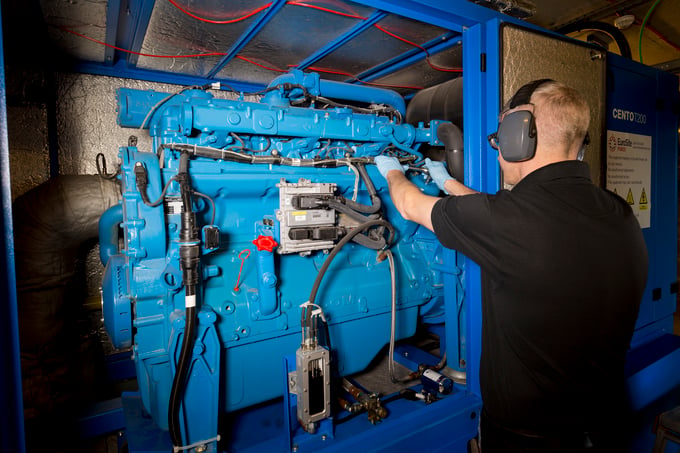Technology company ENTRNCE has announced the development of the Carbon Monitor: a unique data platform that calculates the half-hourly carbon footprint of onsite combined heat and power (CHP) versus conventional methods of heat & grid electricity. The tool is the first of its kind and proves CHP’s continuing role as an energy transition technology.
The Carbon Monitor is currently licensed to EuroSite Power – a UK leader in CHP and other onsite generation technologies. It is being developed by ENTRNCE in cooperation with EuroSite Power, to help estates and energy professionals make the sustainable business case for maintaining their existing CHP systems or investing in new assets.
How the Carbon Monitor works
Grid carbon intensity varies hour by hour, due to the intermittency of renewables such as solar and wind and the varying supply from fossil generators. Until now, comparing the carbon footprint of onsite CHP with grid electricity has been inaccurate, and relied upon average grid carbon intensity figures.
The Carbon Monitor is a web-based data platform which captures real-time data on the GHG emissions produced by a CHP in operation, every 30 minutes. It then compares this with the actual carbon intensity of the grid during those times. It shows the number of half-hourly periods when the CHP in operation was cleaner – or dirtier - than the grid. Estates decision makers get a clear picture of the total carbon saved when the CHP unit was operating. They can also make predictions based on real historical data, to make the business case for new CHP.
CHP as an energy transition technology
CHP is a highly efficient method of generating electricity and heat simultaneously. It is a process that captures the heat that is produced by the generation of electricity and uses it to heat buildings or as part of an industrial process.
The CHP is much more efficient than traditional power generation, which often wastes heat by simply releasing it into the atmosphere. It is a particularly cost-effective solution for sites with a high heat demand such as hotels and leisure facilities, hospitals and industrial processes.
Although conventional CHP operates using natural gas as a fuel source, the Carbon Monitor shows which times of the day it is still less carbon-intensive than receiving electricity from the grid, which, depending on the time of day, can still have a high proportion of fossil fuel sources.
The Carbon Monitor also eases the burden of GHG reporting and futureproofs sustainability managers against greater scrutiny over their emissions calculations.
Jaron Reddy, UK & Ireland Manager at ENTRNCE says:
“The clean energy transition won’t happen overnight, but it will accelerate if we can help energy users understand the true carbon footprint of their onsite generation assets. The Carbon Monitor gives an accurate picture of how well CHP performs – giving estates directors the transparency they need to make informed decisions on energy investments. Besides that, there is a strong case for hydrogen & CHPs. Organisations can use the Carbon Monitor to check the progress they are making in decarbonising their assets.”
Paul Hamblyn, Chief Operating Officer and Managing Director of EuroSite Power says:
“There is no silver bullet to reaching net zero – and with a plethora of onsite decarbonisation and generation solutions on the market, it’s important to us that the carbon-saving credentials of all technologies are backed by independent, robust data. CHP will continue to play a crucial role as an energy transition technology and we’re delighted to be partnering with ENTRNCE to demonstrate this, using the Carbon Monitor.”
For Estates managers considering CHP or seeking to understand the performance of existing CHP assets, visit https://www.eurositepower.co.uk/.
CHP solution providers should contact www.ENTRNCE.co.uk for a demo of the Carbon Monitor.



